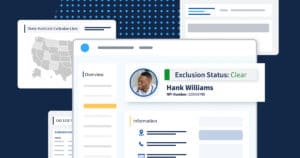The healthcare community is facing many challenges in response to COVID-19. Some of us are facing more critical and dangerous obstacles than others as healthcare heroes across the nation risking their own individual health to treat patients. Across the country, healthcare delivery models are seeing significant changes during this emergency response time to the Novel Coronavirus pandemic. In this post, we’ll discuss some of the latest regulatory updates during emergency response times from government authorities and local healthcare providers.
States Respond to COVID-19 with Interstate Licensure Waivers and Emergency Declarations
State medical and licensing boards across the U.S. are adjusting qualifications and waiving requirements for certain healthcare providers with emergency response declarations. License portability has become a critical and coordinated effort to meet the needs of each state to respond to the pandemic.
For more information about nursing licenses, please refer to the NCSBN State Response to COVID-19. For more information regarding license waivers or expedited licenses for retired physicians, please refer to the Federation of State Medical Boards COVID-19 portal.
Which Licensed Providers are Eligible During COVID-19?
While many state medical boards have eased restrictions on interstate licensed providers, these individuals must be licensed to practice in at least one state or territory within the United States.
To ensure that patients are safe in this emergency response time, healthcare organizations must verify that all licensed providers coming from out of state are not under disciplinary or administrative actions against their license by a licensing agency, in any state, federal, or foreign jurisdiction. Sanctioned or excluded providers are not eligible to provide care to beneficiaries of federal or state healthcare programs.
Primary Source Verification Guidelines
Because state and federal waivers and emergency declarations are changing daily, it’s important to confirm qualifications and exceptions at the primary source for those providing care. Many states have extended renewal and expiration dates for licenses and other credentials during emergency declaration periods.
If a licensed provider has fallen into a grace period for exceptions made in response to COVID-19 from state medical boards, you will need to track and verify these new extension dates and adjust accordingly given certain license renewal dates are extended, or until emergency declarations have been lifted.
We strongly recommend a comprehensive credentialing and ongoing provider monitoring tool for managing your licensed providers. Our Passport solution helps provide a source of truth for each provider or employee and gives a complete profile of their credentials and any outstanding issues with sanctions, exclusions, or board actions taken from state primary sources.
During the COVID-19 emergency response period, our Passport application is addressing license and certification renewal and extensions in real-time. Our tools are supporting health systems and a variety of healthcare organizations proactively manage and assess licensed provider capacity and eligibility during this very hectic and unpredictable time.
How Long Will Healthcare Providers Be Allowed to Work in Multiple States?
Please refer to state primary sources for updates and waivers for each provider during each state’s emergency preparedness or pandemic plan. Medical practice across state lines for certain states will be limited to the duration of emergency declarations (including extensions and waivers) and will then revert to standard operational procedures.
The Joint Commission recently explained guidelines for the Duration for Continuing Disaster Privileges During COVID-19.
“Volunteer Licensed Independent Practitioners (LIPs) who have been granted disaster privileges may continue to provide care, treatment and services under the disaster privileging option (see Emergency Management (EM) standard EM.02.02.13) for the period of time the organization continues to operate under its Emergency Operations Plan (EOP).
– The Joint Commission
Telehealth and Telemedicine Waivers and Guidelines
Telehealth and telemedicine practices are becoming much more widespread and will continue to address the needs of patients in a virtual setting. These services are also operating under new guidelines and conditions given current waivers and eased restrictions on how care is being provided and who is eligible during emergency situations.
Please review any updates from each state’s medical board for the delivery of healthcare across state lines via Telehealth. Beyond state guidance, the General Provider Telehealth and Telemedicine Tool Kit from CMS and OIG’s fact sheet offer guidance on how navigating changing regulations.
Medical Volunteers and Onboarding in COVID-19 Widespread Hotspots
It is encouraging to see our healthcare heroes respond to the needs of cities and states where COVID-19 cases are widespread and considered hotspots at the moment. New York City, Detroit, New Orleans, Los Angeles, New Jersey, and Washington state are all seeking medical volunteers and staff to help treat patients and support local communities.
Though each day may feel very chaotic, each state is working vigorously to register volunteers and licensed healthcare staff to respond to this terrible pandemic. As more providers respond to support these communities, it’s essential to have the tools and resources to quickly determine eligibility and delegation of roles for a coordinated approach. Be sure to check each state’s healthcare volunteer database for the latest information on who can provide help.
State COVID-19 Healthcare Volunteer and Emergency Response Registries
Several states have also developed volunteer and emergency response registries to track the influx of medical volunteers. Check your state’s healthcare volunteer database for the latest information on who is eligible to provide help.
- California Health Corps
- Illinois Department of Public Health Volunteer
- Michigan MI Volunteer Registry
- New Jersey Healthcare Professional Call to Serve
- New York Volunteer Program (ServNY)
- Washington State Emergency Volunteer Health Practitioners
- Association of State and Territorial Health Officials
Federal COVID-19 Healthcare Volunteer and Emergency Response Registries
In addition to state registries, the federal government is also tracking healthcare volunteers responding to COVID-19 through the Emergency System for Advance Registration of Volunteer Health Professionals (ESAR-VHP) and the U.S. Medical Reserve Corps.
ProviderTrust Resources in Response to COVID-19
ProviderTrust believes that it’s essential to keep healthcare safe when it matters most, even if it means giving away our services for those who need them during this time. We recognize the urgent need to verify licenses for healthcare personnel responding to the COVID-19 outbreak, and we’re here to help.
We are grateful for each of you responding to this pandemic. It’s an honor to be your partner, your vendor, and your friend. Here’s to navigating COVID-19 together and supporting each other along the way.









